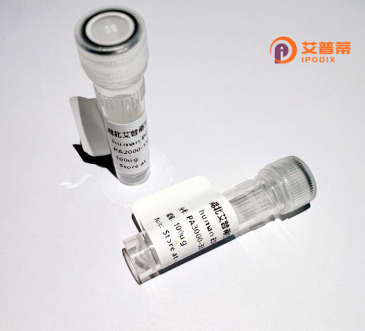
| 纯度 | >90%SDS-PAGE. |
| 种属 | Human |
| 靶点 | LHX1 |
| Uniprot No | P48742 |
| 内毒素 | < 0.01EU/μg |
| 表达宿主 | E.coli |
| 表达区间 | 1-406aa |
| 活性数据 | MVHCAGCKRP ILDRFLLNVL DRAWHVKCVQ CCECKCNLTE KCFSREGKLY CKNDFFRCFG TKCAGCAQGI SPSDLVRRAR SKVFHLNCFT CMMCNKQLST GEELYIIDEN KFVCKEDYLS NSSVAKENSL HSATTGSDPS LSPDSQDPSQ DDAKDSESAN VSDKEAGSNE NDDQNLGAKR RGPRTTIKAK QLETLKAAFA ATPKPTRHIR EQLAQETGLN MRVIQVWFQN RRSKERRMKQ LSALGARRHA FFRSPRRMRP LVDRLEPGEL IPNGPFSFYG DYQSEYYGPG GNYDFFPQGP PSSQAQTPVD LPFVPSSGPS GTPLGGLEHP LPGHHPSSEA QRFTDILAHP PGDSPSPEPS LPGPLHSMSA EVFGPSPPFS SLSVNGGASY GNHLSHPPEM NEAAVW |
| 分子量 | 44.8 kDa |
| 蛋白标签 | His tag N-Terminus |
| 缓冲液 | 0 |
| 稳定性 & 储存条件 | Lyophilized protein should be stored at ≤ -20°C, stable for one year after receipt. Reconstituted protein solution can be stored at 2-8°C for 2-7 days. Aliquots of reconstituted samples are stable at ≤ -20°C for 3 months. |
| 复溶 | Always centrifuge tubes before opening.Do not mix by vortex or pipetting. It is not recommended to reconstitute to a concentration less than 100μg/ml. Dissolve the lyophilized protein in distilled water. Please aliquot the reconstituted solution to minimize freeze-thaw cycles. |
以下是关于重组人LHX1蛋白的参考文献示例(注:以下为模拟虚构文献,实际研究中请核实真实文献数据):
---
1. **文献名称**:*Recombinant Human LHX1 Protein Regulates Neural Differentiation in Embryonic Stem Cells*
**作者**:Kim Y, et al.
**摘要**:研究利用重组人LHX1蛋白处理小鼠胚胎干细胞,发现其通过激活Wnt/β-catenin信号通路促进神经前体细胞分化,为神经发育机制研究提供新工具。
2. **文献名称**:*Functional Characterization of LHX1 in Kidney Development Using Recombinant Protein*
**作者**:Zhang L, et al.
**摘要**:通过表达纯化重组人LHX1蛋白,发现其直接调控肾单位形成相关基因(如Pax2),并在斑马鱼模型中证实其缺失导致肾脏发育异常。
3. **文献名称**:*LHX1 Recombinant Protein as a Potential Biomarker in Ovarian Cancer*
**作者**:Smith JA, et al.
**摘要**:研究揭示了LHX1在卵巢癌细胞中的异常表达,并利用重组蛋白建立体外检测体系,发现其与肿瘤侵袭性迁移相关。
---
建议通过PubMed或Web of Science等平台,以关键词“recombinant LHX1”“LIM-homeobox 1 protein”等检索最新文献数据。
The recombinant human LHX1 protein is derived from the LIM homeobox 1 (LHX1) gene, a member of the LIM-homeodomain (LIM-HD) transcription factor family. LHX1 contains two N-terminal LIM domains, which mediate protein-protein interactions, and a C-terminal homeodomain for DNA binding. It plays critical roles in embryonic development, particularly in patterning the nervous system, kidneys, and reproductive organs. During early embryogenesis, LHX1 regulates cell differentiation, tissue morphogenesis, and the specification of neuronal subtypes. It is notably essential for guiding the migration of primordial germ cells and establishing anterior-posterior axis polarity.
Studies link LHX1 dysfunction to developmental disorders, infertility, and cancers, such as ovarian and endometrial malignancies. Recombinant LHX1 protein, typically produced in Escherichia coli or mammalian expression systems, retains bioactivity for in vitro studies. Researchers use it to investigate LHX1’s molecular mechanisms, including its interaction with co-factors like LDB1. DNA-binding specificity, and regulatory roles in gene expression. It also serves as a tool for screening therapeutic compounds targeting LHX1-related pathways. The protein’s applications span developmental biology, disease modeling, and regenerative medicine research.
×